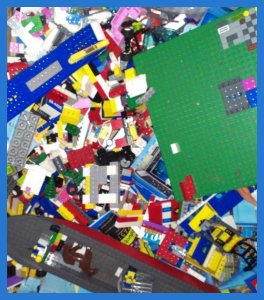I hope you find my writing and business tips and observations useful. My business and blog are dedicated to helping businesses communicate clearly and reach their potential.
Read, subscribe to my newsletter, enjoy!Tash
Take care with huge claims!
It will be my son’s birthday soon and we’ve been looking for a present for him – he adores Lego so we want to get him some miscellaneous bits to play with as well as the sets he already has.
Our search moved onto eBay where we found some listings for bulk lots of Lego.
A few items suited what we wanted and we placed some bids.
Other items didn’t suit so we moved on.
A number of items listed as ‘huge bulk lot’ (yes, there were more than four or five of them! And all seemingly from the same seller) amazed us 🙂
Over promising doesn’t get the sales
What does huge mean? It is something of great size or quantity.
And what does bulk mean? Again, it is about size and, in the context of purchasing items, means a large quantity of something.
So when I look for bulk Lego, I expect hundreds of bricks or even kilograms of Lego.
I don’t consider six wheels or 13 small pieces of Lego to be a ‘huge bulk lot’. Yet the aforementioned seller apparently thinks differently to me!
Needless to say, we’re not interested in buying tiny ‘bulk’ packs of Lego.
Calling his packs of Lego ‘huge bulk lots’ may have attracted people wanting bulk lots – but it wouldn’t be bought by them.
While people after smaller packs of specific bits of Lego wouldn’t necessarily search for bulk packs.
Either way, the seller isn’t using a smart strategy in my opinion.
Over use of adjectives
Adjectives can be useful for providing information and making writing more interesting.
Yet there are two details to remember…
- the adjectives need to be honest and actually describe the noun(s) or the writing just loses credibility
- too many adjectives is not helpful. People start to glaze over when there are too many together – I know that in my busy life, I don’t have time to wade through lots of meaningless adjectives to find out the information I really want so I’m less likely to read something that appears hyped up.
How’s your business – do you add adjectives to hype up a product or keep them to a meaningful minimum? Maybe you have tested it and found lots of adjectives sells more – if so, I’d love to hear your experiences!
Mad libs to teach sentence contructions?
Have you ever done some “mad libs”? Is this something you remember fondly from school days – at least more fondly than the usual grammar lessons?
Personally, I hadn’t heard of mad libs until finding them mentioned in another blog, but apparently they have been widely used to teach children some grammatical terms in a fun way – maybe this is more common in the USA, or maybe I just missed out!
Anyway, a mad lib is where you choose some randoms words – nouns, adjectives, verbs and so on – and they are inserted into a piece of writing. The end result is usually nonsensical, but funny – and especially so for children I suspect!
I remember playing games where we each wrote a type of word, folded the piece of paper and passed it on to write another word on someone else’s piece of paper. The final result there was a funny sentence. Mad libs are similar to that game, but you don’t come up with the entire story with your words.
There is a website that actually creates the mad libs by asking you for the words and then producing the story for you. I tried it, inserting various Australian nouns, verbs and adjectives (in bold below), and got the following story as a result:
| A Typical History Test By: Roger Price & Leonard Stern |
Instructions: When the Australia rings, unfold your papers and answer the following Victorians.1. What general won the Battle of Adelaide.2. Which American river said, “Give me liberty or give me trees“?3. Who was the first president of the United animals of New Zealand?4. Why did Benjamin Franklin fly a/an bird during a thunderstorm?5. Who made the first beautiful flag?Answers to Test:1. Jackson2. Mel Gibson, when he was executed by Russell Crowe for riding.3. Ian Thorpe4. He was discovering koalas.5. Sigrid Thornton |
Finding a fun way to teach children the different types of words (nouns, adjectives, verbs, etc) is important for them to be able to construct good sentences and stories – but it isn’t always a fun topic to study!
Mad libs are certainly light-hearted but do require some knowledge of word types to work. The mad libs site includes definitions of the word types, too, to help children learn as the select words.
Do you think this is a useful tool in teaching children what a noun/verb/adjective/etc is? I’ll be letting my children have a go at these stories and see what they think of them. If I remember, I may even ask their teachers how they view this from an educational point of view.
Use your words wisely!


Recent Comments